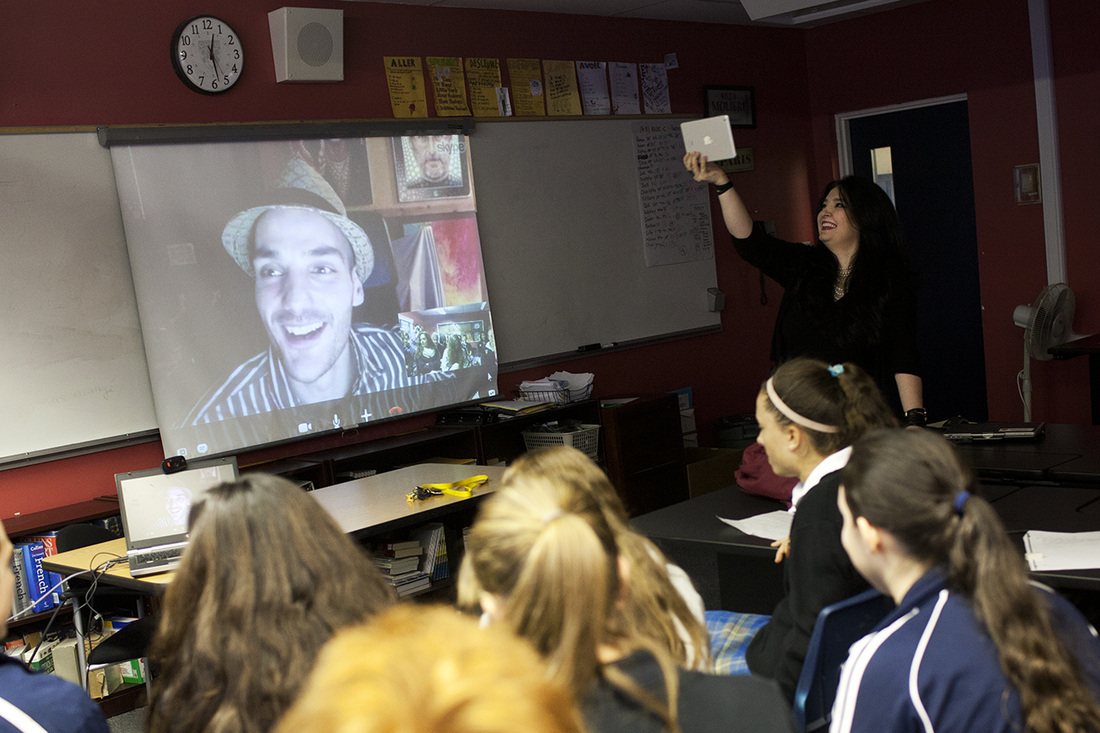By Cherry Zhi
This school year, Madame Mofazali’s French 11 Enriched class had the pleasure of speaking to Congolese singer Lokua Kanza and Belgian artist Ben Heine via Skype. Madame Mofazali knew that there was no better way to enrich students’ cultural understanding than by having them speak directly to French artists from around the world.
This school year, Madame Mofazali’s French 11 Enriched class had the pleasure of speaking to Congolese singer Lokua Kanza and Belgian artist Ben Heine via Skype. Madame Mofazali knew that there was no better way to enrich students’ cultural understanding than by having them speak directly to French artists from around the world.
As a student in the class, I felt the excitement and positive energy that the class exuded after finding out about the interviews. Weeks before we were to meet Lokua Kanza, we spent time reading his biography, listening to his music, and thinking of meaningful questions to ask him. During our research, we learned that he was born in Bukavu, Congo, but moved to Paris in 1984 where he recorded his first personal album; it was a huge success and critics were fascinated by his soulful, folk-tinged music. After living in France for twenty years, he returned to Congo to continue to release music. His most recent album, “Nkolo”, combines many different languages to create a soothing, beautiful cross-cultural musical experience.
On the day of the interview, we enthusiastically greeted him as soon as we saw his smiling face. He did a quick introduction and then each member of the class asked him a question. He was impressed by our questions and we not only learned more about him and the Congolese culture, but we also challenged ourselves to speak French to a successful Francophone singer. At the end of the interview, he sang a song for us and then waved goodbye. He was extremely considerate and kind and gave us greater insight into the world of music.
On the day of the interview, we enthusiastically greeted him as soon as we saw his smiling face. He did a quick introduction and then each member of the class asked him a question. He was impressed by our questions and we not only learned more about him and the Congolese culture, but we also challenged ourselves to speak French to a successful Francophone singer. At the end of the interview, he sang a song for us and then waved goodbye. He was extremely considerate and kind and gave us greater insight into the world of music.
After winter break, we spoke with Ben Heine, a multidisciplinary Belgian artist who has been interviewed by Madame’s class for the past three years. Before meeting him, we watched his documentary and learned that he was born in Côte d’Ivoire where he lived for seven years before moving to Brussels, Belgium. He is best known for his original series “Pencil Vs Camera” as well as “Digital Circlism” and “Flesh and Acrylic”. His works blend imagination and reality to create a sense of surrealism. Before meeting him, our class created our own “Pencil Vs Camera” pieces, which Madame sent to Ben.
When we finally got to meet him, he greeted us warmly and then praised us for our “Pencil Vs Camera” pieces. He named a few specific pieces and then asked the artists to explain their work. When he praised my work, I was stunned; a professional, talented artist was praising my art! Ben’s easygoing and encouraging nature made it easy for us to ask him questions. He not only gave us more insight into his artistic process but he also explained the role that art played in his community. Between the questions, he cracked a few jokes and praised some students’ French accents. His kindness boosted our confidence in our French abilities and his story inspired us all to stay determined in pursuing our dreams.
Lokua Kanza and Ben Heine were both incredibly kind and knowledgeable. In addition to enhancing our Francophone cultural understanding, they sparked our interest in the arts. Most of all, their stories and messages inspired us to never give up on doing the things that we love.
Lokua Kanza and Ben Heine were both incredibly kind and knowledgeable. In addition to enhancing our Francophone cultural understanding, they sparked our interest in the arts. Most of all, their stories and messages inspired us to never give up on doing the things that we love.

